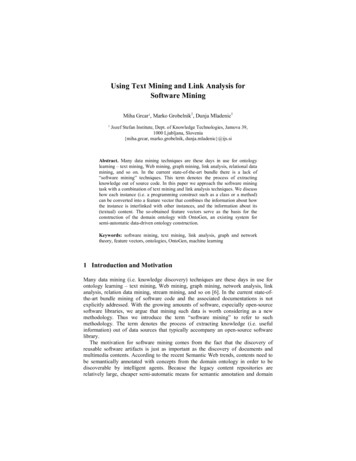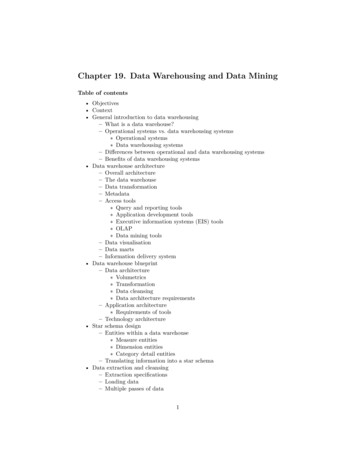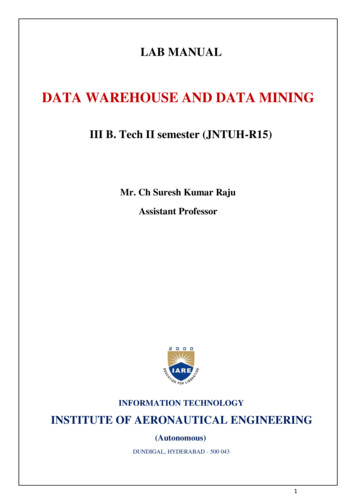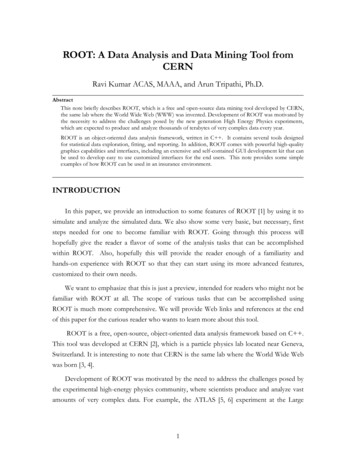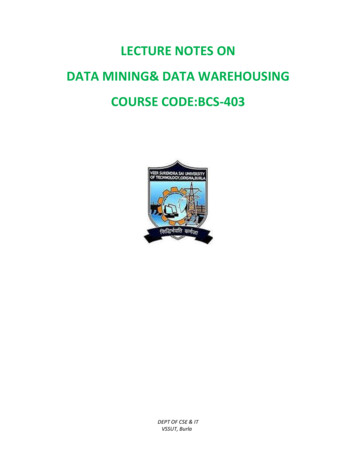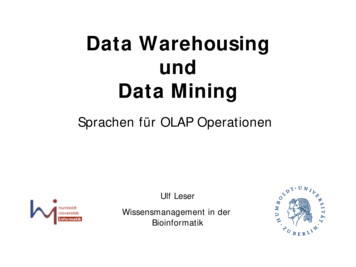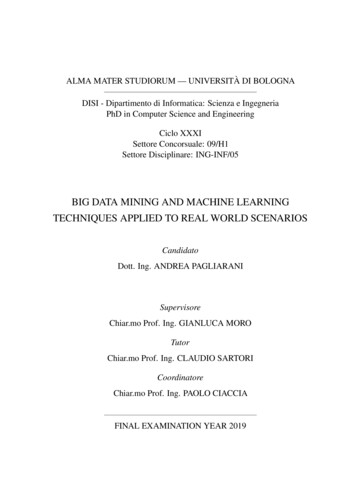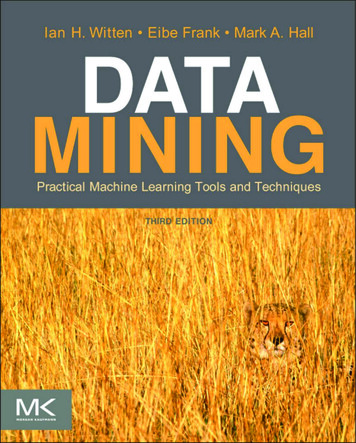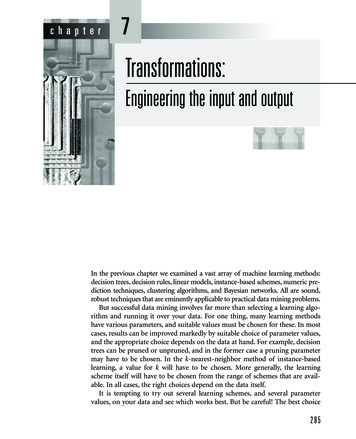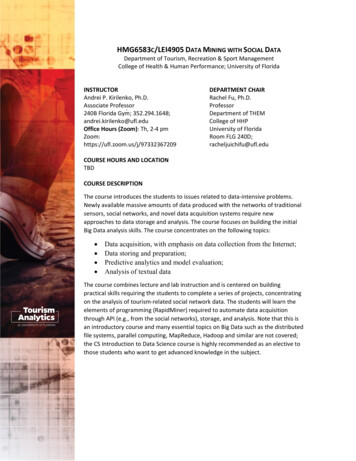
Transcription
HMG6583C/LEI4905 DATA MINING WITH SOCIAL DATADepartment of Tourism, Recreation & Sport ManagementCollege of Health & Human Performance; University of FloridaINSTRUCTORAndrei P. Kirilenko, Ph.D.Associate Professor240B Florida Gym; 352.294.1648;andrei.kirilenko@ufl.eduOffice Hours (Zoom): Th, 2-4 pmZoom:https://ufl.zoom.us/j/97332367209DEPARTMENT CHAIRRachel Fu, Ph.D.ProfessorDepartment of THEMCollege of HHPUniversity of FloridaRoom FLG 240D;racheljuichifu@ufl.eduCOURSE HOURS AND LOCATIONTBDCOURSE DESCRIPTIONThe course introduces the students to issues related to data-intensive problems.Newly available massive amounts of data produced with the networks of traditionalsensors, social networks, and novel data acquisition systems require newapproaches to data storage and analysis. The course focuses on building the initialBig Data analysis skills. The course concentrates on the following topics: Data acquisition, with emphasis on data collection from the Internet;Data storing and preparation;Predictive analytics and model evaluation;Analysis of textual dataThe course combines lecture and lab instruction and is centered on buildingpractical skills requiring the students to complete a series of projects, concentratingon the analysis of tourism-related social network data. The students will learn theelements of programming (RapidMiner) required to automate data acquisitionthrough API (e.g., from the social networks), storage, and analysis. Note that this isan introductory course and many essential topics on Big Data such as the distributedfile systems, parallel computing, MapReduce, Hadoop and similar are not covered;the CS Introduction to Data Science course is highly recommended as an elective tothose students who want to get advanced knowledge in the subject.
COURSE OBJECTIVES Identify tools to download and filter network data from online sourcesBe able to develop your own tools for data acquisition andwarehousingBe able to use computational tools for data miningBe able to apply the basics of the opinion analysis and sentimentanalysisBy the end of the course students should gain basic knowledge of dataacquisition, pre-processing, and data mining techniques, including the socialmedia data, and be able to apply these skills to effectively carry out and presentresearch projects in tourism and destination management.PREREQUISITESHLP 6515 Evaluation Procedures in Health and Human Performance and HLP 6535Research Methods or consent of the instructor based on taking similar courses onresearch methods, introductory statistics and data analysis.COMPUTERS AND SOFTWAREPersonal computers are strongly recommended. The UF computer labs will havenecessary software, but you will need to follow labs’ reservation schedule tocomplete your assignments. Note that I will provide instruction and help forWindows PC; Mac should be ok (the software we are will be using works on eitherplatform).The course uses RapidMiner visual programming environment with additionalpackages. Install the following software on your computers (I will help withinstallation issues during the first lab): RapidMiner Studio: install free RapidMiner Studio fromhttps://rapidminer.com/educational-program/ Select Windows, Mac, orLinux download. You might be asked to additionally install Java. Registerwith RapidMiner as a student – you will use an educational version of thesoftware. Do not use the Basic version!RapidMiner add-on for Web mining and text processing. In the bottom-leftcorner of RapidMiner main window click a link “Get More Operators”. Thensearch for Web Mining.Microsoft Office – make sure you have Excel and Access installed.If you want to expand your capabilities in data mining by learningPython:
Register for interactive Python course (I will provide an advice on datamining libraries): https://www.codecademy.com/learn/pythonGood introductory course on data analysis with Python from Coursera willteach you popular tools such as pandas and ata-analysis . Select “audit” for afree course.TEXTBOOKSRequired Matthew North. Data Mining for the Masses. Free download gForTheMasses.pdfWitten, Frank. Data Mining. Practical Machine Learning Tools andTechniques, 3rd ed. A hard copy from Amazon.com is 40.Kotu, Deshpande. Predictive Analytics and Data Mining: Conceptsand Practice with RapidMiner. E-book from the University library.Permalinks: https://bit.ly/2YXjMma; https://bit.ly/2MSHYjhTan, Introduction to Data Mining (Chapters 3, 7 4, 8). Free downloadfrom http://www-users.cs.umn.edu/ kumar/dmbook/index.phpOptional reading for deeper understanding Foster Provost, Data Science for Business: What You Need to Knowabout Data Mining and Data-Analytic Thinking.Jennifer Golbeck. Analyzing the Social Web.Steven Bird, Ewan Klein, and Edward Loper. Natural LanguageProcessing with Python – Analyzing Text with the Natural LanguageToolkit. Free book is available online: http://www.nltk.org/book/Reza Zafarani, Mohammad Ali Abbasi, Huan Liu. Social MediaMining. An Introduction. Free book is available online:http://dmml.asu.edu/smm/SMM.pdfMatthew A. Russell. Mining the Social Web: Data Mining Facebook,Twitter, LinkedIn, Google , GitHub, and More. Free older edition isavailable online: eb-2nd-EditionAl Sweigart, Automate the Boring Stuff with Python - PracticalProgramming for Total Beginners. Get for free athttps://automatetheboringstuff.com/ASSIGNMENTS AND EVALUATIONThere will be home assignments, occasional quizzes, student presentations (onlygrad students), and term project for this class. The total grade G (0-100%) will be aweighted mean of the grades in the following categories:
Grad students1. Lab assignments (20%)2. Student presentations (20%)3. Quizzes (20%)4. Term Project (40%)Undergrad students1. Lab assignments (25%)2. Quizzes (25%)3. Term Project (50%)The final percentage points are translated into the letter grades using the followingscheme:PercentageLetter GradePercentageLetter Grade90 – 100A70 – 76.99C87 – 89.99B 67 – 69.99D 80 – 86.99B60 – 66.99D77 – 79.99C Below 60EIf you noticed a scoring error, notify the instructor within one week that a scoringerror is made. No issues regarding scoring will be reviewed beyond this period orafter midnight of the last day of the Examination week, whichever comes first. ForUF grading policies ns/info/grades.aspxQuizzesAn occasional short quiz will usually cover the material from the previous theme,but expect occasional questions related to the earlier topics. The quizzes will beclosed book. The exams will have the same format (with few more problems tosolve), and may cover any topic in the course. For full credit make sure theinstructor is able to read through your handwriting. 100% grade will require fullanswer to all questions, a returned blank paper will be evaluated 0%, and areasonable progress towards answering the questions will be evaluated somewherein between.AssignmentsThe lab work has to be submitted through the course management system as anassignment. The acceptable submission format is a Word or pdf file. If the lab workis not finished in class, it has to be completed at home. 100% grade will require fullanswer to all questions of the lab, no returned assignment or a returned blankpaper will be evaluated 0%, and a reasonable progress towards answering thequestions will be evaluated somewhere in between.Project
During the course, the students will work on group projects on a problem of theirinterest. The project should follow the steps outlined during the lectures, that is,literature review, research design, data collection, data analysis, and researchpresentation. Project results should be presented in a form of a research report(due prior to the date and time of the final exam) AND an oral presentation.Expect 100% grade for using multiple sources of information for preparation of yourreport, professional data analysis, in-detail presentation of the topic, intelligentanswers to the questions, and active engagement into discussion of the projectsduring the project meetings. See Appendix A for clarifications. For participation inproject discussion, expect full grade for asking questions, submitting answers,sharing your opinions and similar class-time participation.Presentation (only grad students)The students will be asked to make presentations on methods or research papers.Expect full grade for: Making good, professionally sound 20-25 min presentation;Successfully connecting the presentation to the topics discussed in class andto other peer-reviewed literature; answering the questions in a clear,professional manner.COURSE CALENDARRefer to Appendix B for course calendar.CLASS POLICIESGroup work and academic honestyThe plagiarism and other violations of the academic honesty will be punished with0% grade for the assignment; the offender will be reported to the head ofdepartment and/or graduate school for possible actions. The UF defines plagiarismin the following way ucthonor-code):“(a) Plagiarism. A student shall not represent as the student's own work all or anyportion of the work of another. Plagiarism includes but is not limited to:1. Quoting oral or written materials including but not limited to those found on theinternet, whether published or unpublished, without proper attribution.2. Submitting a document or assignment which in whole or in part is identical orsubstantially identical to a document or assignment not authored by the student.”
Further, each student is expected to abide by the Honor Code: “We, the members ofthe University of Florida community, pledge to hold ourselves and our peers to thehighest standards of honesty and student-conduct-honor-code/).Furthermore, you are obligated to report any condition that facilitates academicmisconduct to appropriate personnel. Please refer to the abovementioned HonorCode for a complete explanation of the University of Florida Academic HonestyPolicy.If you are not able to make it to the classAlways contact me through Canvas if are going to miss a class or unable to return anassignment in time.Late assignment submission or skipping a quizClosely follow the course logistics with respect to submission of your work. Allassignments (quizzes, problems from the textbook, and SPSS labs) are due prior tothe beginning of the next class. Late submissions are penalized: Up to 48 hours later-20%. No make-up assignments or quizzes will be allowed except as required by theUniversity Policies. An example of allowed missed assignment is a student athlete’sgame travel, as requested by his/her trainer’s email. Requirements for classattendance and make-up exams, assignments, and other work in this course areconsistent with university policies that can be found ns/info/attendance.aspx.Note that a minor sickness or a short travel will not be considered an excuse for notreturning the homework. The reason for point deduction is that you always will begiven enough time to complete and return an assignment few days before the duedate; please plan ahead for possible emergency situations.PresentationsIf you are unable to deliver a presentation due to a confirmed medical reason orfamily emergency, it will be re-scheduled for a later date if possible; otherwise 0%credit or an “incomplete” grade will be assigned.FoodWater in bottles and spill-proof cups is allowed by the class policies, but may beprohibited in a specific room; food is not allowed. Remember: soft drink spills killcomputer equipment.Special accommodations
Students requesting special classroom accommodations must first register withthe Dean of Students Office. Also, please let the instructor know your needsASAP.Miscellanea1. Please switch off the sound on your phones and refrain from using theInternet, playing games, reading the books and other activity unless it isdirectly related to the course.2. Unless an urgent business requires my attention, I will be available forquestions after the lecture hours. For more complex questions that requiresubstantial time please secure an appointment by sending in an email.3. Students are expected to provide feedback on the quality of instruction inthis course by completing online evaluations athttps://evaluations.ufl.edu. Evaluations are typically open during the lasttwo or three weeks of the semester, but students will be given specifictimes when they are open. Summary results of these assessments areavailable to students at https://evaluations.ufl.edu/results/.”CAMPUS RESOURCESHealth and WellnessU Matter, We Care: If you or a friend is in distress, please contact umatter@ufl.eduor 352 392-1575 so that a team member can reach out to the student.Counseling and Wellness Center: -1575.University Police Department, 392-1111 (or 9-1-1 for emergencies).http://www.police.ufl.edu/Sexual Assault Recovery Services (SARS): Student Health Care Center, 392-1161.Disability resource center: https://drc.dso.ufl.edu, 392-8565,accessUF@ufsa.ufl.edu.Academic ResourcesE-learning technical support, 352-392-4357 (select option 2) or e-mail to Learningsupport@ufl.edu. https://lss.at.ufl.edu/help.shtml.Career Resource Center, Reitz Union, 392-1601. Career assistance and counseling.http://www.crc.ufl.edu/
Library Support, http://cms.uflib.ufl.edu/ask. Various ways to receive assistancewith respect to using the libraries or finding resources.Teaching Center, Broward Hall, 392-2010 or 392-6420. General study skills andtutoring. http://teachingcenter.ufl.edu/Writing Studio, 302 Tigert Hall, 846-1138. Help brainstorming, formatting, andwriting papers. http://writing.ufl.edu/writing-studio/Student Complaint
Analysis of textual data The course combines lecture and lab instruction and is centered on building practical skills requiring the students to complete a series
